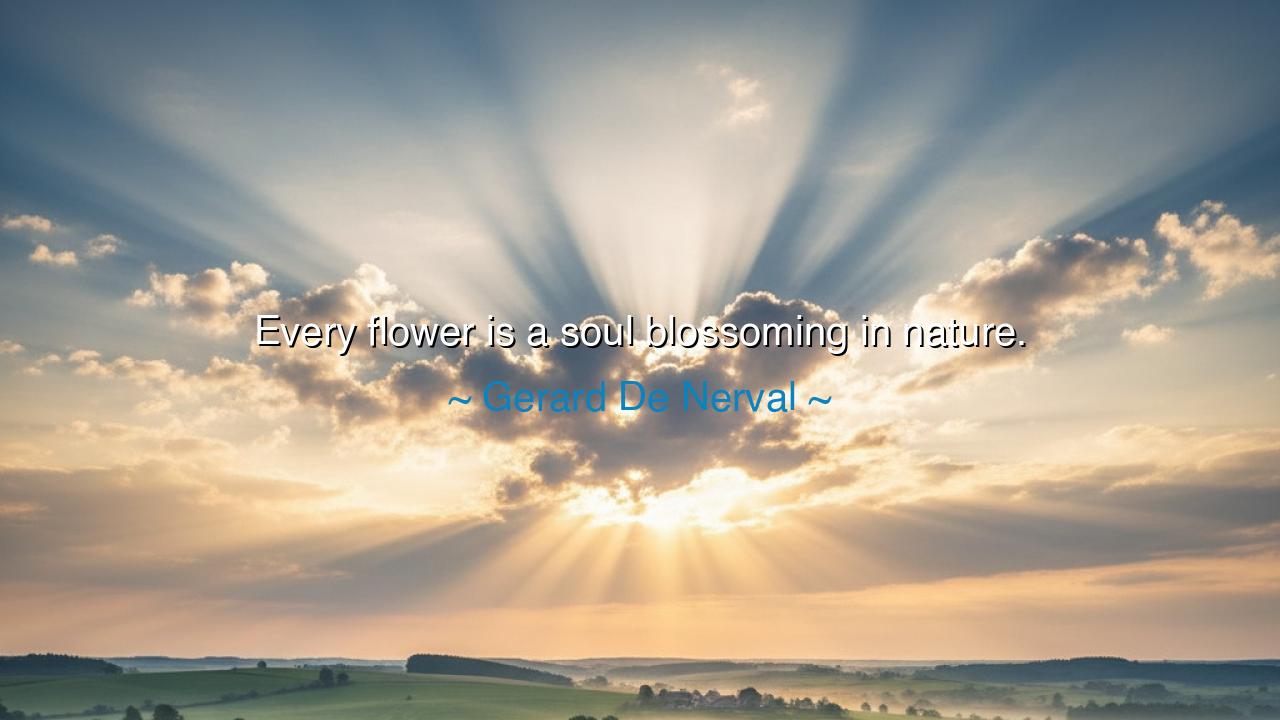
Every flower is a soul blossoming in nature.






The poet Gerard de Nerval once wrote: “Every flower is a soul blossoming in nature.” These words are not a passing ornament of verse, but a vision of the cosmos itself, wrapped in the fragile beauty of a petal. For in the flower, Nerval does not merely see color and form — he sees the breath of life made visible, the soul of the world breaking forth in silence. Each blossom becomes a testimony that spirit and matter are not divided, but united, and that the eternal finds its dwelling in the smallest of earthly forms.
To the ancients, the flower was never only a thing of beauty; it was a messenger. The Greeks crowned their victors with laurel, not for fragrance, but because leaves and blossoms proclaimed the triumph of mortal effort and divine favor. The Persians wrote poetry where roses were the mirrors of love, their thorns the inevitable shadow of longing. In Nerval’s words, this ancient wisdom returns: every flower is a soul, not just a decoration of the earth, but a spark of eternity breaking into the realm of time.
Consider the life of Mahatma Gandhi, who once said that he saw God in “every leaf of grass, every flower, every creature.” Gandhi’s revolution was not only political but spiritual: his eyes discerned souls where others saw only things. To him, a flower was not less than a temple, for in its silent blooming he recognized the infinite at work. The great strength of his nonviolence flowed from this recognition — that to harm the smallest blossom is to dim the soul of the whole. His life shows that Nerval’s words are not poetry alone, but a vision that can transform the way nations walk the earth.
The blossoming of the flower is also the blossoming of our own inner being. Just as the bud must endure the dark nights of winter before it can open, so the soul must pass through trials before it reveals its beauty. The flower, in this sense, is a teacher of patience and resilience. It does not open before its time, nor force its petals against the season. It waits for the right hour, and then, with quiet courage, it unfolds. So too must we learn to wait, to endure, and to blossom when the hour of destiny calls us forth.
There is also in Nerval’s vision a call to reverence. If every flower is a soul, then the garden is not merely earth’s ornament, but a sanctuary. How carelessly men trample fields, cut forests, and waste the tender creations of the soil! Yet to step among blossoms without reverence is to walk among souls without respect. This awareness should kindle humility: when you touch a flower, you are in communion with the eternal breath of the universe.
What then is the lesson for us? It is this: see with the eyes of the heart. Do not pass by the flower as if it were nothing, for in that moment you blind yourself to the soul that pervades all things. In your dealings with people, too, recognize that each human being is a blossom in the vast garden of existence — unique, fragile, radiant, and filled with mystery. To scorn them is to scorn the divine artistry of life itself.
Practically, this teaching demands that we cultivate reverence in small acts. Pause to notice the wildflowers by the roadside. Plant a garden, not only for food but for beauty. Speak to others as if speaking to souls in bloom, not as tools or obstacles. Let patience guide your growth, as the seasons guide the flower. In doing so, your own soul will blossom, and you will join the great harmony of nature that Nerval glimpsed in his quiet vision.
Thus remember: “Every flower is a soul blossoming in nature.” To live with this truth is to walk in a world that is no longer mute, but alive, radiant, and sacred. It is to know that the eternal whispers not only in scriptures and stars, but also in the delicate unfolding of a petal, and in the silent blossoming of your own heart.






AAdministratorAdministrator
Welcome, honored guests. Please leave a comment, we will respond soon